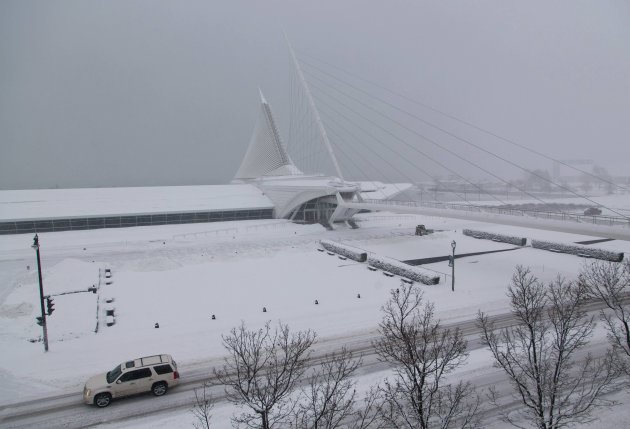
CONCORD, N.H. (AP) -- After the first full day of winter brought everything from balmy temperatures along the Mid-Atlantic to snow in the Midwest and ice, snow and flooding in the Great Lakes, some people could be left in the dark for Christmas.
Much of the foul weather that occurred Sunday has lessened or disappeared entirely, but the harsh aftereffects were expected to linger.
Brad Hoving, a meteorologist with the National Weather Service in Grand Rapids, Mich., said most people were without power in some counties between Grand Rapids and Lansing, Mich. Some may not have electricity until Wednesday or even Thursday, he said.
"It's a big deal," Hoving said. "It's Christmas and we've just had a major ice storm," with trees toppling over and ice-covered power lines.
By late Sunday, ice and snow had knocked out power to 440,000 homes and businesses in Michigan, upstate New York and northern New England — about half of whom had their power back by early Monday. The storm also left more than 400,000 customers without electricity in eastern Canada.
At least nine deaths in the U.S. were blamed on the storm, including five people killed in flooding in Kentucky and a woman who died after a tornado with winds of 130 mph struck in Arkansas. Five people were killed in Canada in highway accidents related to the storm.
By late Sunday, nearly 700 flights nationwide had been canceled and about 7,200 were delayed, according to aviation tracking website FlightAware.com. But flights were mostly running on schedule on Monday morning.
During one of the nation's busiest travel times, icy weather was expected to make roads slick and hazardous through at least Monday from the upper Midwest to northern New England.
Record high temperatures were reached in some Mid-Atlantic states this weekend, but temperatures were expected to drop back to the mid-30s by Monday night.
On Sunday, the mercury reached 70 degrees in New York's Central Park, easily eclipsing the previous high of 63 from 1998. Records were also set in Wilmington, Del., (67), Atlantic City, N.J., (68), and Philadelphia (67). Washington tied its 1889 mark at 72.
The scene was much more seasonal Sunday in Vermont, where Lynne White of West Charleston listened to the cracking of falling tree branches and gazed at the coating of ice on her home.
"It's actually really pretty," she said. "Not safe, I'm sure, but it's pretty."
Heavy snow in Wisconsin forced dozens of churches to cancel Sunday services. Milwaukee got about 9 inches and Manitowoc, 7. Ice and snow in Oklahoma were blamed for three traffic deaths on slick roads.
In New York's St. Lawrence County, almost 2 inches of ice had accumulated by early Sunday, coating tree limbs and power lines, and a state of emergency was declared to keep the roads clear of motorists.
"It's a big party weekend ... before Christmas," county dispatch operations supervisor Jim Chestnut said. "This put a little bit of a damper onto that."
Despite a glaze of freezing rain in Maine, plenty of shoppers ventured to the outlet malls in Kittery on the last weekend before Christmas.
In Canada, crews struggled to restore service to those without power in Ontario, Quebec and New Brunswick. Toronto Mayor Rob Ford called the storm one of the worst in the city's history. Passengers were stranded at airports from Toronto to St. John's, Newfoundland.
In Kentucky, five people were killed in flooding caused by the storm system. The bodies of three people were pulled from Rolling Fork River on Sunday after their vehicle was swept away by floodwaters, a fourth person drowned in Carroll County after a four-wheeler overturned in high water and a body was discovered in Ballard County near a car abandoned in a flooded ditch.
In Arkansas, authorities said a woman was killed after an EF2 tornado with winds of about 130 mph struck in St. Francis County on Saturday. A man found in a field was hospitalized in serious condition, while the woman's 3-year-old granddaughter and 25-year-old daughter were treated at a hospital.
In Ohio, heavy rains left many low-lying roads and highways blocked. In Findlay, located 47 miles south of Toledo, the Blanchard River rose 12 feet since Friday to major flood-stage levels.


